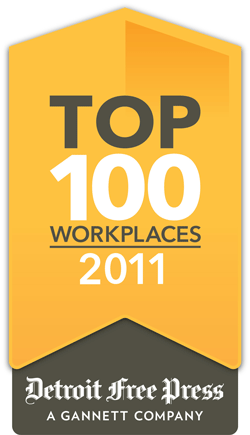Contributed by Kendall Folds, Safety Coordinator and Military Recruiting representative.

Duncan Aviation was named one of the top 100 places to work in Michigan in 2011.
Below are the answers to some of the most frequently asked aviation career questions from military personnel who will be separating from the military service soon.
What licenses are required for a civilian aviation career?
If you have received training/experience as an airframe or powerplant mechanic and are interested in pursuing that as a aviation career, we strongly encourage you to obtain your A&P (airframe and powerplant) certifications. Having either your A (airframe) or P (powerplant) is good but, having both A&P in addition to your military experience will make you more marketable to aviation employers.
How will my military experience and training transfer to general aviation?
Hydraulics is hydraulics and flight controls are flight controls. Many military aircraft have the same operating systems as business aircraft and use similar equipment, manuals and tools. Your technical training and skills acquired while serving in the military are easily transferred to a civilian aviation career with a very low learning curve.
What interview questions can I expect?
Each company that you apply for will have questions specific to them and the position they need to fill. The following are some basic questions that will help you prepare for any interview.
- Describe your work history and how it has prepared you for this position.
- What are your greatest strengths / areas of improvement?
- What is the toughest problem you've had to face, and how did you overcome it?
- What was most or least rewarding about your previous position?
- Are you willing to work overtime? Nights? Weekends?
- Tell me about a time when you had to deal with a co-worker who wasn't doing his/ fair share of the work. What did you do and what was the outcome?
- Why should we hire you?
Will I have to relocate?
Unless the company and position you are applying for are in your current location, then you will be required to relocate.
Will I have help with moving expenses?
Most employers, who recruit outside of their geographic area, are likely to provide some type of relocation package to new hires. If this offer is not presented to you at the time you receive a job offer, don’t be afraid to ask for it. Although employers may not offer this benefit up front, they may be willing to negotiate some type of assistance. Be prepared to give them a dollar figure if negotiating.
Duncan Aviation makes it a standard practice to provide relocation assistance to any new employee who is required to move to start their aviation career with us.
Will I need my own tools or equipment?
Most aviation companies require that you have your own tools and tool box and will provide a minimum tools list. This is a basic list and other tools may need to be added to complete your tool collection. It is also not uncommon for companies to offer financial assistence in the way of no-interest or low-interest loans repaid through payroll. Ask if this is an option.
With a manager's approval, Duncan Aviation will set up individual tool accounts as interest free loans to acquire the tools of their trade.
25% of Duncan Aviation's team members are former and/or active service members. Visit http://www.duncanaviation.aero/careers/apply.php to view aviation careers at Duncan Aviation.
Kendall Folds is Duncan Aviation's Safety Coordinator and Military Recruiting representative located in Lincoln, NE. He specializes in the coordination and administration of workplace safety and recruiting qualified personnel from all branches of military service. His aviation career begin in 1977.


